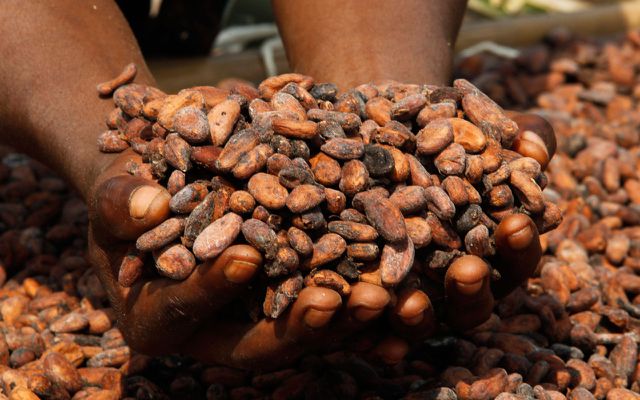From biscuits to bars to pralines, the selection of chocolate products is huge, as is the demand: consumers in Europe eat around nine kilograms per capita and per year. Often without knowing the questionable conditions under which cocoa is grown. To change that, Fairtrade is launching the Sweet Revolution, a protest campaign for fair cocoa. Join us!
In everyday life, many chocolate lovers think more about the calorie content of their favorite bar of chocolate than about the origin of the cocoa beans. Extreme poverty, exploitation and child labor are part of the bitter reality of cocoa cultivation. About 14 million people make their living from the production of cocoa – mainly smallholder families who cultivate less than five hectares of land. The small area under cultivation alone drives many of them into poverty, so that they can hardly live from cocoa cultivation alone. In addition, there are extreme price fluctuations: raw cocoa is traded on the world market in London and New York, where there is always speculation on prices. All too often the producers have to sell their cocoa below value.
West Africa, the heart of the chocolate industry

Most of the world’s cocoa – over 60 percent – comes from West Africa, especially from Ghana and the Ivory Coast. In both countries, exploitative child labor is a major problem. Experts from the National Opinion Research Center at the University of Chicago (NORC) estimate that there are over two million children involved in cocoa cultivation. Child labor is more widespread today than it was ten years ago.
The chocolate industry has been promising for years that it will fight child exploitation. After all, who wants to enjoy chocolate for which children are sent to the fields instead of to school?
Cacao cultivation: hard work that hardly pays off
One of the main causes of exploitative child labor is the far too low income. Cocoa producers in Ivory Coast earn just 67 cents on average per capita and per day. This is the result of a study by Fairtrade International. The study not only calculates what farmers actually earn, but also what they would have to get in order to receive a living income. In other words, an income that covers the cost of food, water, housing, education, health, transport, clothing and other essential needs – including saving for emergencies. For this, the workers would have to receive at least 2.13 euros per capita and per day.
Even Fairtrade-certified cocoa farmers still get too little. In order to benefit from fair trade, cooperatives usually have to sell at least 30 to 40 percent of their goods under fair trade conditions. Although the market for fair trade cocoa has developed enormously in recent years, demand should increase significantly. Fairtrade cocoa currently has a market share of 17 percent.
You think that’s not enough? Then join us and stand up for fair cocoa.
Take part and win until December 6th
Together with Fairtrade you can support the people who pick the cocoa beans for your chocolate. In an online competition, Fairtrade is looking for the best protest slogans for fair cocoa enjoyment. With just a few clicks and a little creativity, you can become an online activist for sustainable cocoa yourself. It’s that easy:
Get creative and design your message for more fairness in the cocoa sector alone, with your friends, acquaintances, at school, in a club or at university.
Share your creative protest slogan via social media.
Activate your environment and collect votes for your slogan. The slogan with the most votes wins.
The internationally renowned street artist Boogie interprets the ten best slogans on a protest wall, the Wall of Fair. With this we will make your protest against unfair cocoa trade on December 10th, the day of human rights, heard in the Berlin government district. Boogie even pays a personal visit to the most creative slogan author and creates an individual work of art live on site.
Second and third place winners can also look forward to smaller boogie artworks of their own protest slogan. Fairtrade surprise boxes packed with fair chocolate products are raffled off for places four to ten.
Dah Oha – cocoa farmer, mother and power woman

Stories like that of the cocoa farmer Dah Oho Gboklela from Gogoko, a small village about 50 kilometers from the Ivorian coast, show the difference that fair trade can make for producers: Due to the early death of his father, Dah Oho has to take responsibility early on. Because the debt money is too expensive, she begins an apprenticeship as a hairdresser before taking over the family’s small cocoa field together with her brother. When she marries, she is granted her own piece of land – not a matter of course in the Ivory Coast, where only 20 percent of landowners are women. She joins the fair trade cooperative ECAKOOG, gets more money for her cocoa and gets tips on how to fertilize properly. This increases earnings and thus earnings. With the help of the Fairtrade premium money, the cooperative also supports its members financially in financing school fees.
For every tonne of cocoa that Dah Oho sells under fair trade conditions, she receives a fixed minimum price, which must not be undercut. Not even if market prices collapse. The minimum prices cover the costs of sustainable production and enable necessary investments in new plants, crop protection or equipment. However, the money is not enough to secure the existence of the family. Like many cocoa producers, Dah Oho can only sell part of their harvest on fair terms. The remaining cocoa is traded on the exchange at the prices specified there. A business that is hardly worthwhile, as the mother of four children explains. She wishes for a better future for her children away from the cocoa trade. They should go to school, become civil servants and later not have to go to the fields – at least not when prices are so low.
